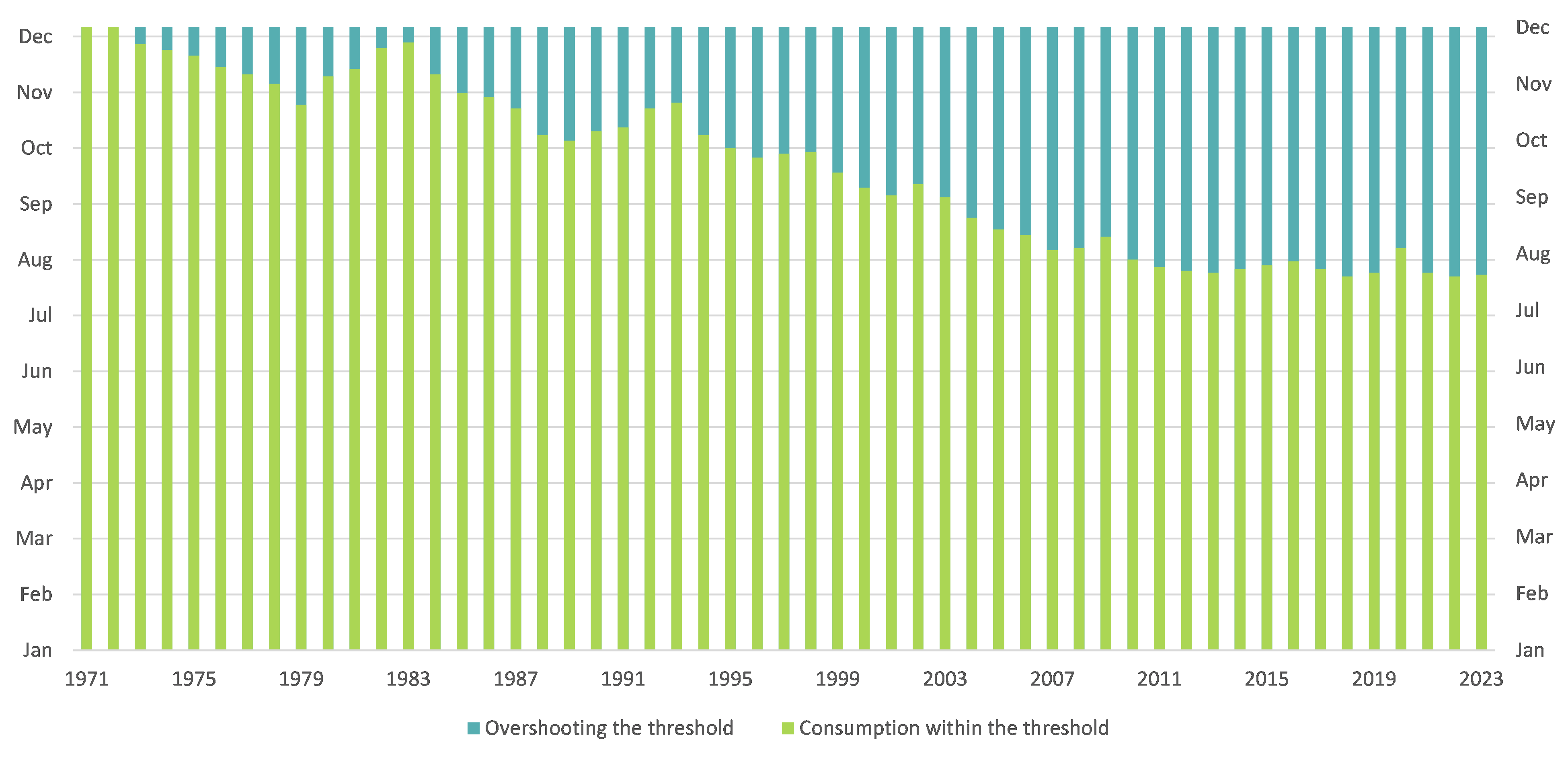- Home »
- Insights »
- DWS Research Institute »
- Earth Overshoot Day – Moving the Date
This year, Earth Overshoot Day (EOD) falls on August 2. This is the point in the calendar when human consumption of ecological services, such as water provision and carbon storage, passes the point at which the earth can replenish these services in any given year. This marks a significant increase in humanity’s demand for ecological resources compared to the early 1970s, when resource requirements were estimated to be almost exactly what could be regenerated in a year, Figure 1. The demands on the world’s resources have been pressured by a doubling in world population[1] and a fourfold increase in world gross domestic product[2] over the past half century.
Figure 1: Earth overshoot day since 1971
 Source: Global Footprint Network www.footprintnetwork.org
Source: Global Footprint Network www.footprintnetwork.org
Decisive action to start the transformation urgently needed
When it comes to bringing EOD back towards balance and possibly into surplus, all is not lost. However, it requires transforming and intervening across multiple sectors. This needs to start with a focus on decarbonization across sectors such as oil and gas and power generation and the expansion of renewable energy and energy efficiency, since these can deliver a relatively quick win in moving EOD.
It is therefore welcome that more and more countries, regions, states and companies are signing up to net zero climate pledges,[3] Figure 2.
Figure 2: Net zero target setting by number of entities
Source: Net Zero Stocktake 2023 Net_Zero_Stocktake_23.pdf (edcdn.com)
According to the Global Footprint Network, reducing carbon emissions by 50% would move EOD by 93 days. Actions such as introducing a carbon price on high emitting sectors across the developed and emerging world as well as moving power generation to low-carbon sources such as solar and wind are two of the most effective ways to achieve this goal. If one includes energy efficiency measures, such as building retrofits, and moving to low-carbon public transportation these can add as much as 34 days to EOD, Figure 3.
Figure 3: The number of days Earth Overshoot Day could be moved back in the event of specific actions
Source: Earth Overshoot Day. Global Footprint Network (2023)
Energy efficient buildings are one important building block
The International Energy Agency[4] has concluded that energy efficiency such as insulation, heat pumps, LED lighting, waste heat recovery and other technologies can be particularly effective in strengthening Europe’s energy security. For example, between 2016 and 2021 global energy final demand grew by 6%, but, in the absence of energy efficiency measures, energy demand would have been 13% higher.[5]
Since buildings represent 40% of Europe’s energy use and create around 36% of Europe’s greenhouse gas emissions[6] the widespread acceleration of energy efficiency measures to green existing European buildings and infrastructure are essential.
Energy efficiency and building retrofitting have added benefits besides using less resources since they can improve air quality, boost productivity and support health and well-being. In addition, building retrofits can increase asset valuations, reduce financial risks and deliver significant economic stimulus benefits.[7]
Addressing the problem of food waste
But moving EOD also needs action in other parts of the global economy. For example, in our food systems. Today, 40% of the food grown around the world is either lost or wasted,[8] even though 2.4 billion people did not have access to adequate food last year.[9] Addressing food waste requires a change in retailers' and consumers' behavior when it comes to preparing food that is not eaten or throwing away food that is past its sell-by date.
This month,[10] the European Commission has proposed legally binding targets to cut food waste by 30% per capita by 2030. However, more ambition is required. For example, this falls short of the pledge made by the consumer good industry[11] where 10 of the largest companies have set a goal to work with their 20 largest suppliers to cut food waste by half by 2030. If collectively the world could cut food waste by this amount it would mean EOD falling 13 days later in the year.
Financing the transformation
Initiatives such as carbon pricing, energy efficiency and sustainable technologies across the building, transportation and industrial sectors and tackling food waste can also offer attractive investment opportunities. This includes buying EU carbon allowances which may help create real world emission reduction, while retrofitting buildings can deliver higher real estate valuations[12] and lower mortgage default risk.[13] When it comes to food waste, WWF has been working with its partners[14] to deploy artificial intelligence in grocery retails chains’ purchasing systems. The result was, on average, a 14.8% reduction in food waste for every store piloted in the project.
These measures will help strengthen energy security, power greenhouse gas emissions’ reduction and deliver employment growth across the European continent[4] Such transformational steps may also provide the chance for a “double dividend” of first, helping to mitigate the impacts of climate change and moving back EOD and second realizing sustainable economic growth from the creation of new technologies and solutions over time.




